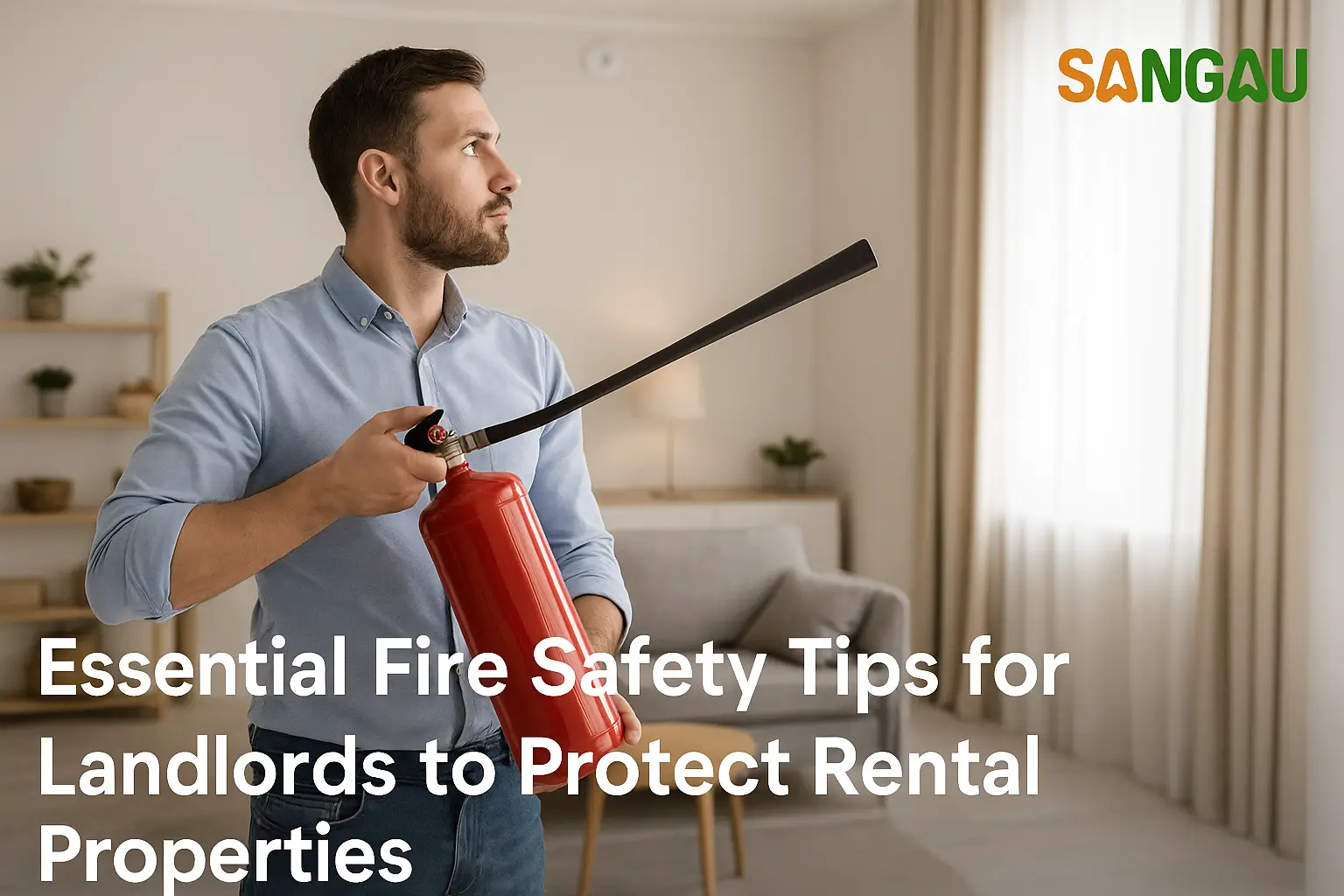Essential Fire Safety Tips for Landlords to Protect Rental Properties.
Published : 22 Sep 2025

Hello property owners and managers! Whether you’re overseeing a single flat or multiple rental units across India — or managing properties remotely as an NRI — fire safety is a responsibility you simply cannot overlook. Fires can cause devastating consequences, including loss of life, serious financial damage, legal complications, and harm to your reputation.
In densely populated cities like Bengaluru, Mumbai, or Hyderabad, the risk of fire is especially high due to compact building layouts and the constant use of electrical appliances. In this article, we’ll explore practical fire safety measures and maintenance tips for your rental properties, helping you safeguard your investment while protecting your tenants’ wellbeing.
1. Install Smoke Detectors Where It Matters Most
A smoke detector is your first line of defence against fire disasters. Unfortunately, many landlords skip this essential device because it is not compulsory in smaller buildings — a dangerous oversight.
Install smoke detectors in key areas such as kitchens, corridors, and living rooms, particularly in PG (paying guest) accommodations or multi-tenant units. Battery-operated models are affordable, easy to install, and don’t require electrical wiring. These devices provide early warnings, allowing tenants to evacuate safely and emergency services to respond quickly.
2. Keep Fire Extinguishers Ready and Regularly Serviced
Every rental property must have at least one fire extinguisher, ideally positioned in the kitchen or common areas. However, simply installing extinguishers isn’t enough — regular servicing is vital.
In India, fire extinguishers should be inspected, pressure-tested, and recharged periodically. Property managers should keep track of service dates and coordinate with certified technicians for annual inspections. Well-maintained extinguishers are essential to ensure functionality during an emergency.
3. Check Electrical Wiring and Prevent Circuit Overloads
Electrical faults are among the leading causes of residential fires in India. Ageing wiring, poor-quality switchboards, and overloaded sockets can create fire hazards.
For properties over 15 years old, schedule an electrical inspection every 2–3 years with a licensed electrician. In newer homes, include this check during tenant move-in. Using Miniature Circuit Breakers (MCBs) and Earth Leakage Circuit Breakers (ELCBs) helps control power surges and reduce fire risks.
4. Educate Tenants on Fire Prevention and Safety
Even with the best equipment, human behaviour heavily influences fire safety. Educate your tenants during onboarding about fire risks, safe practices, and emergency procedures.
Explain how to operate fire extinguishers, identify emergency exits, and avoid risky behaviours like overloading power strips or leaving gas unattended while cooking. Tenants who understand fire safety are better equipped to prevent accidents.
5. Promote Safe Cooking Practices and Kitchen Ventilation
The kitchen is a hotspot for fire incidents, especially in Indian homes with pressure cookers, open flames, and oil frying.
Ensure kitchens have adequate ventilation by installing chimneys or exhaust fans to prevent smoke and heat buildup. Advise tenants not to place gas stoves near flammable curtains or wooden cupboards. Regularly inspect LPG cylinders and replace worn-out hoses to minimise leak or explosion risks.
6. Maintain Clear Escape Routes and Fire Exit Access
In a fire emergency, quick and unobstructed evacuation is critical. Keep hallways, staircases, and emergency exits clear at all times.
It’s common in Indian residential buildings to find these escape routes blocked by scooters, furniture, or rubbish. As a landlord or property manager, conduct regular walkthroughs to ensure all emergency paths remain accessible and hazard-free.
7. Choose Fire-Resistant Interiors and Furnishings
Flammable materials accelerate fire spread. Avoid foam mattresses, synthetic curtains, or PVC panels, especially in shared rental units.
Opt for flame-retardant upholstery and treated wood finishes wherever possible. These small but smart choices can significantly limit fire damage and improve tenant safety.
8. Use Gas Leak Detectors for LPG-Based Kitchens
For rental properties that use LPG cylinders, installing gas leak detectors is a simple yet effective safety measure.
These devices alert occupants to gas leaks well before they become dangerous, particularly important in cities like Pune, Chennai, or Hyderabad where bottled LPG is common. Gas leak detectors add an affordable layer of kitchen safety.
9. Prepare a Fire Emergency Plan with Your Tenants
Tenants may not know how to react during a fire. Provide a clear emergency plan, detailing extinguisher locations, local fire service contacts, and evacuation routes.
Display laminated instructions in prominent places such as kitchens or entrances. For larger residential complexes, organise annual fire drills to improve tenant awareness and readiness.
10. Follow Local Fire Safety Laws and Stay Updated
Fire safety compliance is not optional — it’s mandatory. Different Indian cities have specific regulations based on building size, occupancy, and location.
Ensure your property holds valid fire No Objection Certificates (NOCs), displays clear exit signage, maintains working hydrants, and meets all fire safety standards. Compliance not only protects your property but also your legal liability. Non-compliance risks fines, denied insurance claims, or worse — avoidable tragedies.
Bonus Insight: Prevention Comes Before Insurance
While fire insurance is essential, it cannot replace proactive fire prevention. Insurance claims take time and may be refused if negligence is involved. More importantly, insurance cannot save lives or undo physical harm.
Think of insurance as a backup, not your primary defence. Your best protection is the safety measures and vigilance you implement today.
Final Thoughts
Fire safety is a critical aspect of responsible property management, whether you’re a local landlord or an NRI managing remotely. Implementing these fire safety tips will help you protect your investment, build tenant trust, and ensure peace of mind.
If you found these insights helpful, please like, share, and follow us for more practical property management advice from SANGAU. Stay safe, stay prepared — because prevention is protection.
#FireSafety #LandlordTips #RentalPropertySafety #PropertyManagement #SANGAU


